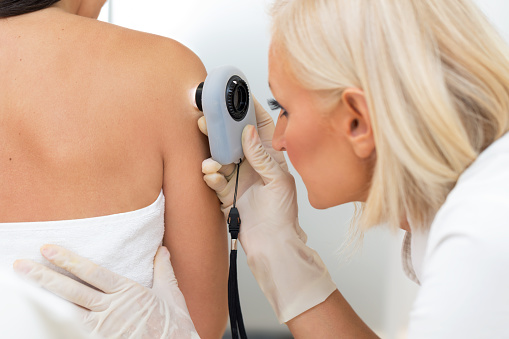Sussex Premier Health, Hastings: Important update for patients with upcoming appointments
Sussex Premier Health, Hastings: Important update for patients with upcoming appointments
Benign removal of a skin blemish generally for cosmetic reasons.

Moles, skin tags, cysts and warts are skin growths that are usually completely harmless but can look unsightly.
They are usually harmless but can become troublesome if they catch on clothing or you cut them while shaving.
They can also be large, noticeable and situated in a prominent place, making you feel self-conscious about the way you look.
Many people choose to have them removed privately.
All of our consultants are of the highest calibre and benefit from working in our modern, well-equipped hospitals.
Our consultants have high standards to meet, often holding specialist NHS posts. Many of our consultants have international reputations for their research in their specialised field.
Your initial consultation
You’ll meet your consultant in one of our private consultation rooms. During this time they’ll ask about your medical history symptoms and examine the area where you may have a mole, cyst, wart or skin tag.
You consultant will discuss with you the best technique for you.

It may be that you have treatment on the same day as your consultation or it could be that you need to come back on another occasion, your consultant will advise you on what’s best for you.
We understand that any medical procedure can be a cause of anxiety – even if it’s a relatively straightforward one like this. That’s why our experienced and caring medical staff will be there for you every step of the way.
The affected area of skin will be numbed with a local anaesthetic before the doctor starts the removal procedure. If you’re worried about the procedure the doctor may also give you a sedative to make you feel more relaxed.
The exact technique used will depend on size and location but moles and larger lesions are usually removed with a scalpel the wound closed with stitches and then covered with a temporary dressing.
Warts will be frozen off with cold liquid nitrogen gas or destroyed with a precision high-energy laser while skin tags are normally ‘snipped’ off with surgical scissors.
This type of treatment is a routine outpatient procedure, so patients can leave as soon as they are ready to be discharged. On some occasions, you may be required to have the treatment as a day case procedure.

You will probably experience some soreness after the anaesthetic wears off. Our nurses will be able to let you know what over-counter pain relief can be taken, if required.
You won’t need to take time off work and you should be able to return to your normal activities straight away.
Avoid getting the incision site wet for the first few days. It’s quite normal for a scab to develop and this will generally heal within a week or two. Any inflammation will usually disappear within a few weeks too.
The operation will usually leave a scar. How big and noticeable this will be depends on the exact operation. Most scars fade significantly over the first year.
We will also give you advice on how to reduce the appearance of your scar, such as gently massaging the site after your stitches have been removed.

If you have a skin lesion such as a mole cyst wart or skin tag and would like it removed it is usually a simple procedure. You may want to take this step because it may be painful and restricting your movement. Or it could look unsightly and it is having a negative effect on your self-confidence especially if it is on the face or another visible part of your body. Removal is a relatively straightforward procedure that is usually done under local anaesthesia – so you won’t feel any discomfort and you’ll be able to go home the same day. If you decide to have your treatment with us you will be looked after by an experienced multi-disciplinary care team.
Our patients are at the heart of what we do and we want you to be in control of your care. To us that means you can choose the consultant you want to see and when you want. They’ll be with you every step of the way.
Even after you’ve left hospital, we’re still looking after you every step of the way.
On rare occasions, complications can occur following treatment. If you experience any of these symptoms –
Please call us straight away as you might have an infection. Your consultant will talk to you about the possible risks and complications of having this procedure and how they apply to you.
If you have any questions or concerns we’re ready to help.
Speak to a member of our team